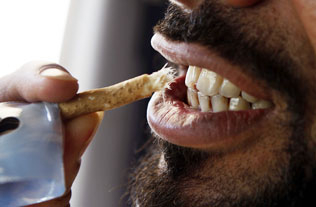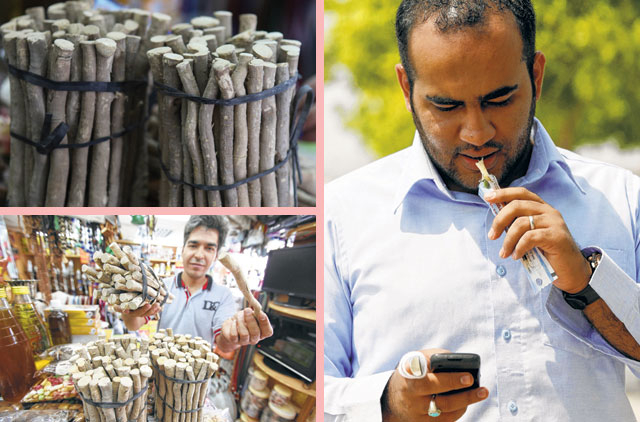
Abu Dhabi: If you thought it might sound old-fashioned to suggest you start using tree twigs to clean your teeth, you are wrong. The World Health Organisation for oral hygiene has recognised the multiple benefit of miswak.
The miswak or siwak is a teeth-cleaning twig taken from the Salvadora persica tree known as arak in Arabic or peelu in Urdu. Studies have found the valuable medical properties of this tree include abrasives, antiseptics, astringent, detergents, enzyme inhibitors and fluoride.
A small tree with a curved trunk and splintered bark, Salvadora persica has fibrous branches used as toothbrushes and are known for their pleasant fragrance and a pungent taste.
The tree has long elliptic leaves and have greenish to yellowish flowers, which are very small, and round fleshy pink and scarlet fruits. Tolerable to very dry environments, the tree grows in abundance in deserts as well as by river banks and in wet areas. Highly salt-tolerant, it can also grow on coastal regions.
Used by pharaohs
Dr Laurent Garcin, botanist, traveller and plant collector gave the tree its generic name in 1749 in honour of Juan Salvador (1598-1681) the apothecary of Barcelona.
The true specimen of this species has roots in Persia but originally pharaohs and Babylonians started using miswak approximately 7,000 years ago. It was subsequently used throughout the Greek and Roman empires and then adopted worldwide by Muslims.
The benefits to oral hygiene and health are numerous. The potassium, sodium, chloride, sodium bicarbonate and calcium oxides found in the root strengthen the tooth enamel, while the bark contains an antibiotic which suppresses bacteria growth and plaque formation.
Miswak reduces stains from tobacco products, coffee and tea. In addition it contains natural nutrients like fluorine, silicon, vitamin C and more.
"Miswak is an effective tool to clean the teeth surface. However, for better cleaning between the teeth, it should be accompanied by flossing. Miswak should be used at least three times a day," Dr Mohammad Ramzi, oral surgeon at the Swiss dental clinic told Gulf News.
Recommended
"The properties of Miswak and the oils and substances it contains make it ideal to fight bad breath. That is why it still is currently used," he added.
Miswak has been in use by Muslims for thousand of years.
"The use of miswak was strongly recommended by the Prophet Mohammad (PBUH) in several hadeeth, one of which is a clear direct recommendation to use miswak (‘But for my fear that it would be hard for my followers, I would have ordered them to clean their teeth with Siwak on every performance of ablution." — True Hadeeth by Abu Huraira)," Shaikh Ahmad Al Mousa, an official at the General Authority for Islamic Affairs and Endowments told Gulf News.
"The Prophet recommended its very frequent use when waking up and before sleeping, before going to mosques and prior to gathering with people as well as after all meals. This was a call from the Prophet to apply preventive medicine as Miswak contains antibacterial substances," he added. "Whether using toothbrush or miswak the purpose is to clean the mouth as recommended by the Quran," he said
Whitening
"I myself had a gum bleeding problem. After using toothpaste that contained miswak the bleeding stopped," Al Mousa concluded.
"After using miswak for a couple of months, a friend asked me where did I have my teeth whitened, which I did not. It was just the use of miswak that whitened my teeth and gave them a glowing and shiny look," said Heba, a 45-year-old Egyptian.
The popular, pungent picks
A small tree with a curved trunk and splintered bark, Salvadora persica has fibrous branches used as toothbrushes and are known for their pleasant fragrance and pungent taste.
The tree has long elliptic leaves and greenish to yellowish small flowers and round fleshy pink to scarlet fruits. Tolerating of a very dry environment, the tree grows in abundance in deserts. Highly salt-tolerant, it can also grow on coastal regions.
Dental benefits of Miswak
- Strengthens and stop bleeding gums.
- Kills gum disease-causing bacteria.
- Fights germs and bacteria .
- Fights plaque effectively.
- Fights against caries.
- Removes bad breath.
- Leaves the mouth fresh and fragrant.
- Whitens teeth.
- Improves sense of taste.
- Eliminates toothache.
- Stops decay that has already set in.
- Increases salivation and inhibits dry mouth (xerostomia).
- Miswak is more effective than brushing with a toothbrush in reducing plaque and gingivitis provided it is used correctly
Benefits of Miswak
- Environmentally friendly, the Miswak stick is biodegradable. Nothing left to litter.
- Inexpensive.
- Natural source of fluoride.
How to use miswak?
Trim or chew the bark off one end of the stick; about 1 centimetre. Chew on the exposed end until the twig forms bristles, then brush as usual without toothpaste. Every few days cut off the exposed bristles, peel the bark and start anew. If it becomes dry, soak in rose water to soften the end bristles
USE OF MISWAK TREE
- Fruits: can be eaten raw, cooked, or dried.
- Fermented drinks: are made from the fruit.
- Leaves: bitter and aromatic, with a taste likened to mustard are cooked as a sauce or as a green vegetable.
- Tender shoots, seeds and seed oil are also edible.
- Salts: are obtained from ashes.
- Fodder: leaves and young shoots are valued as a camel, sheep and goat forage. Leaves make good fodder as their water content is high.
- The leaves are said to increase lactation in cows.
- Apiculture: the tree is a good source of nectar.
- Fuel: the wood is used for firewood and charcoal (but not to cook meat).
- Timber: The wood is soft, white, and easy to work and is not liable to termite attack. Used for coffins and clubs.
- Gum or resin: resin that drips from the tree is useful for making varnish..
- Lipids: seeds are used to produce oil used for soap and detergent industries.
Medicine:
- Leaves' decoction is used as mouthwash.
- Roots' decoction is used to treat gonorrhea (a common sexually transmitted infection), spleen trouble and general stomachache.
- Roots are used for chest diseases.
- The bark latex is used for treating sores.
- Seeds are used as a tonic and seed oil is used on the skin for rheumatism.
Services:
- Shade or shelter: used as windbreaks to protect farm habitation, gardens and orchards.
- Reclamation: planted in sand dune reclamation and useful for reclaiming saline soil.
Geographic distribution
Miswak is native to Algeria, Angola, Cameroon, Chad, Egypt, Eritrea, Ethiopia, India, Iran, Palestine, Jordan, Kenya, Libyan Arab Jamahiriya, Malawi, Mali, Mauritania, Mozambique, Niger, Nigeria, Oman, Pakistan, Saudi Arabia, Senegal, Somalia, South Africa, Sri Lanka, Sudan, Syria, Tanzania, Uganda, Yemen, Zambia and Zimbabwe.













